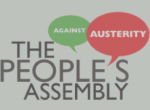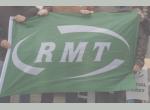The article below appears in the financial pages of the Guardian.
RMT Executive member Olly New said, "Just sometimes - you get a bit of truth from the media. This article from the financial pages of the Guardian makes it clear that the 800 LUL job cuts are only the beginning of a drive to re-structure LUL, cut more jobs and attack trade unionism. This is about investment funding and planned Government cuts to transport and the rest of public services. LUL’s statements about Oyster cards being the reason for the cuts is so much rubbish.
"If we don’t stand up, it will get worse and worse."
=====
http://www.guardian.co.uk/uk/2010/sep/05/transport-london-job-losses
Job losses 'inevitable' to fund upgrade of London transport network • TfL's £39bn funding settlement until 2018 to be reassessed • London Underground staff face 800 redundancies
The London transport network faces waves of industrial unrest amid fears that more jobs and services will be cut under Boris Johnson's funding settlement with the government.
Transport secretary Philip Hammond and Johnson, the London mayor, have identified the preservation of multibillion-pound upgrades to the tube system as a key priority. However, on the eve of a one-day walkout by tube workers over staff cuts, transport experts have warned that preserving the underground revamp will inevitably lead to deep cuts in Transport for London's operational budget – setting the mayor's TfL authority on a collision course with trade unions.
Stephen Glaister, director of the RAC Foundation and a former TfL board member, said possible cuts "will force the pace on industrial relations issues". The London Underground, which carried 1 billion passengers last year and accounts for 45% of TfL's revenues, employs about 20,000 people and would be a prime candidate for cuts if the upgrades are preserved.
"There is probably scope to reduce the cost of operations at London Underground because it is heavily unionised and has not been subjected to competitive pressures," said Glaister.
But the difficulty of carving out costs on the tube network will be underlined tomorrow, when the RMT and TSSA unions are due to begin a 24-hour strike over plans to cut 800 jobs including 450 ticket office posts. TfL says the changes will not involve compulsory redundancies, but union officials claim they are a threat to health and safety.
Tony Travers, director of the Greater London group at the London School of Economics, said TfL would have no choice but to tackle parts of the organisation where trade union representation is strongest. Up to half of the LU workforce, including train drivers, station staff and engineers, could walk out on Monday – causing massive disruption to 3.5 million tube commuters.
Travers said: "Preserving the upgrades will concentrate the reductions in spending on the parts of London Underground that are most strike-prone, which are the bits featuring the RMT, the TSSA and [drivers' union] Aslef. So it solves one problem but it creates many more."
The chancellor, George Osborne, has told departments to prepare for cuts of between 25% and 40%, with TfL facing deep cuts because it accounts for nearly a quarter of Department for Transport spending. Overhauling the Northern, Victoria, Piccadilly, Circle, District, Metropolitan and Hammersmith & City lines by 2018 will cost TfL about £10bn. Under the previous mayor, Ken Livingstone, TfL secured a £39bn funding settlement from 2010 to 2018. However, that is now likely to become a smaller four-year settlement with the fate of the £16bn Crossrail scheme to be decided by the Treasury in a beauty contest with capital projects from other departments across Whitehall.
Government sources claim Crossrail is unlikely to be scrapped, although the scope of the project could be curtailed. Peter Hendy, London's transport commissioner, said TfL would "not cease" to make the case for the upgrades but was also determined to protect frontline services. "This includes a commitment to all stations being staffed at all times, and to protecting the quality and volume of Tube and bus services so imAportant to our customers and to businesses across the capital."
A DfT spokesperson said: "The decision about where to make savings following this autumn's spending review will be for the directly elected mayor. However, we have a shared commitment with the Mayor to economically-important projects such as Crossrail and Tube investment."
- 2729 reads






